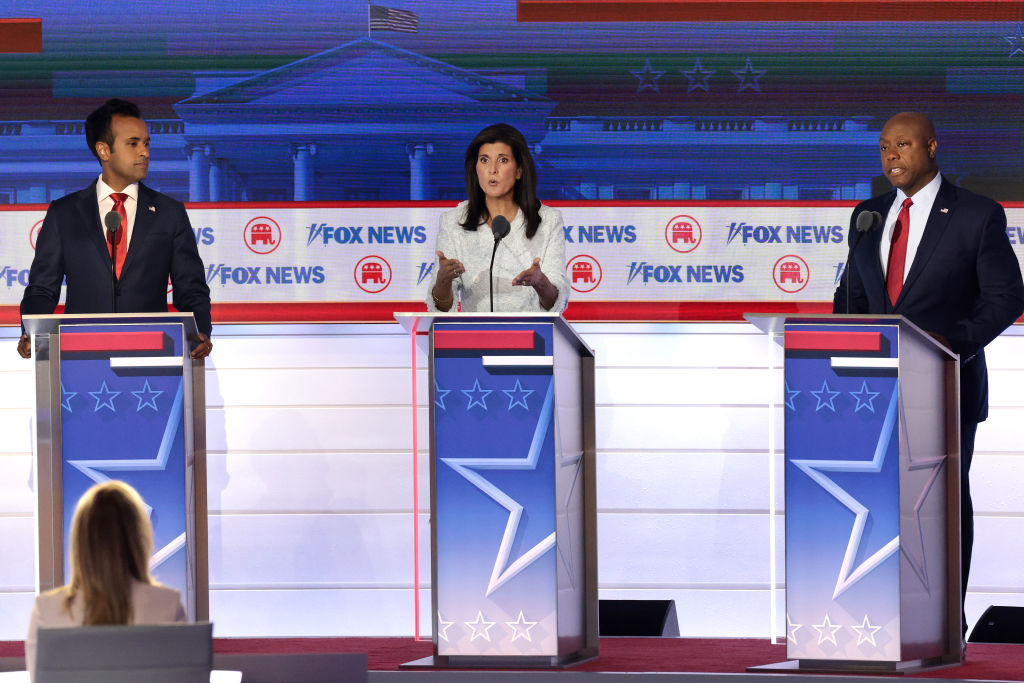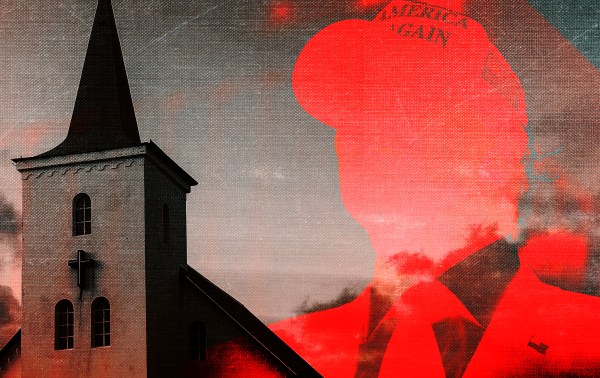Happy Friday! We had a fun time Wednesday evening in the spin room—the post-debate hotspot where presidential surrogates defend their preferred candidates and take calculated hits at their biggest competition.
Here’s Donald Trump Jr. in Milwaukee during a post-debate scrum with reporters about who he thinks performed the worst: “Well, Ron DeSantis, because he needed to do good, he sat there like a wallflower.” And who had the best debate performance? “Vivek, I think, landed some great shots. And he made some incredible points. He had original thought, and more importantly, it wasn’t robotic. Right? Does that make sense?”
Up to Speed
- Former President Donald Trump surrendered to a jail in Fulton County Thursday evening after a grand jury in Georgia indicted him and 18 co-defendants earlier this month over their alleged efforts to overturn the 2020 presidential election. Trump has been indicted four times since leaving the presidency, but Thursday marked the first time he had his mug shot taken. He spent about 20 minutes in jail and was released on a $200,000 bond. Let the mug shot fundraising games begin!
- The House Judiciary Committee launched an investigation on Thursday into Fulton County District Attorney Fani Willis. “Your indictment and prosecution implicate substantial federal interests, and the circumstances surrounding your actions raise serious concerns about whether they are politically motivated,” Republican House Judiciary Chairman Jim Jordan wrote in a letter to her office.
- Failed 2022 gubernatorial candidate Kari Lake tells The Dispatch she’s still “seriously” considering running for U.S. Senate in Arizona and is engaged in ongoing conversations with the National Republican Senatorial Committee about her 2024 plans. “I just bumped into them last night actually,” Lake said in a brief interview Thursday afternoon in the Milwaukee Mitchell International Airport. “We had a really great conversation, we had an excellent conversation with one of the top people at the NRSC,” added Lake, who declined to name the NRSC official. “Could not have been better, could not have been more supportive. And I just texted him actually, before I went through TSA.” Lake, who still has not conceded her 2022 election loss to Democratic Gov. Katie Hobbs, said she hopes to make a decision about a Senate run in “the next couple of months.”
A Bump for Haley After Milwaukee
Voter interest in Nikki Haley is surging after the underdog presidential contender delivered a breakthrough performance during a combative Republican debate in Milwaukee.
Since Wednesday evening, online engagement with individuals, organizations, and social media platforms supporting Haley’s 2024 bid spiked 1,500 percent. That included a 700 percent increase in interactions on X, formerly known as Twitter, both during and following the primetime debate hosted by Fox News; a doubling of viewership on Haley’s YouTube channel; and increased visits to her campaign website equaling 10 times normal traffic.
The Haley campaign shared these figures with The Dispatch Thursday evening, less than 24 hours after the conclusion of a prime-time debate aired by Fox News and viewed by an average of nearly 13 million people across the country.
“Voters saw Nikki Haley’s toughness and readiness to be president in last night’s debate. The response is overwhelming. We’ve raised more online in the last 24 hours than on any day since the campaign started,” says Haley’s campaign spokeswoman Olivia Perez-Cubas.
The Haley campaign declined to say how much money it raised in the hours following the debate, nor would it reveal a baseline figure to contextualize claims of robust fundraising—for instance, its previous best day for online grassroots giving. But Haley’s strong performance was plain to see. Polling and focus groups after the debate, along with Google search metrics during and after the televised faceoff, are consistent with a campaign that experiences higher engagement and financial support immediately afterwards.
Indeed, search engine queries have often proven particularly reliable in gauging support for presidential candidates following a crowded primary debate, and Haley was the second most Googled participant during the event, outpacing all but one of seven competitors on the stage. (Vivek Ramaswamy was first.) Haley couldn’t have picked a better time to impress Republican primary voters. She has been campaigning since mid-February and still trails significantly—nationally and in Iowa, New Hampshire, and her home state of South Carolina.
Haley, a former South Carolina governor and former U.S. ambassador to the United Nations, told The Dispatch in early July that she expected to see substantial progress for her bid “by midfall,”—after the first two Republican debates. The next such event is scheduled for late September. Former President Donald Trump, the overwhelming frontrunner for the nomination, did not participate in Milwaukee and has suggested he’ll skip the next debate, too.
As for this debate: A senior Haley adviser told Dispatch Politics during a conversation in the spin room in Milwaukee Wednesday evening that the only woman running in the Republican primary did exactly what she set out to do. “She does what she always did—she takes unscripted questions, she never backs down from a fight. She knows her issues,” the adviser said. “She’s tough as nails, and when someone poked at her, or said something wrong, she stood up and responded.”
Tucker Asks Trump About Political Violence
If you were to believe right-wing provocateur Charlie Kirk, Tucker Carlson’s interview with Donald Trump released Wednesday evening had some 10 times the viewers of the Republican primary debate that aired on Fox News at the same time.
Carlson’s interview was released on X, the social media platform formerly known as Twitter that, according to its own FAQ, counts as a view any video that plays for more than two seconds with more than 50 percent of the screen exposed to the user. So it’s unclear exactly how many people watched the pre-recorded Carlson-Trump interview, but those who did—fans of one man or the other, or both, mixed with curiosity-seekers and hate-viewers—got a disorderly, meandering conversation that drifted from the bizarre (Jeffrey Epstein, waterless sinks) to the predictable (grievances about Fox News, exaggerations of polling leads) and included a generous sampling of the conspiracy-laden outrage fuel that have become trademarks of each man. But for a conversation between two of the most influential figures on the political right, it was mostly forgettable and will mostly be forgotten.
But not entirely. Forty-four minutes into the 46-minute interview, Carlson casually asked Trump, “Do you think we’re moving towards civil war?”
Trump paused a moment before answering.
There’s tremendous passion and there’s tremendous love. You know, January 6 was a very interesting day because they don’t report it properly. I believe it was the largest crowd I’ve ever spoken before and you know some of the crowds I’ve spoken before—and, like July 4 on the mall, I think they had a million people there. But I think that the biggest crowd I’ve ever spoken before was on January 6 and people that were in that crowd—a very, very small group of people—and we said patriotically and peacefully, peacefully and patriotically, right, nobody ever says that, go peacefully and patriotically. People that were in that crowd that day, very small group of people went down there and then there were a lot of scenarios that we can talk about. But people in that crowd said it was the most beautiful day they’ve ever experienced. There was love in that—there was love, and unity. I have never seen such spirit and such passion and such love, and I’ve also never seen, simultaneously and from the same people such hatred of what they’ve done to our country.
“Do you think it’s possible that there’s open conflict?” Carlson wondered. “We seem to be moving towards something.”
“I don’t know, I don’t know—you know, I can say this: there’s a level of passion that I’ve never seen, there’s a level of hatred that I’ve never seen,” Trump responded. “And that’s probably a bad combination.”
There are a couple of ways to look at this exchange. On the one hand, Trump avoided the kind of unapologetically violent rhetoric that he has used in recent months. (This spring, he shared a social media post where he is depicted holding a baseball bat near the head of Manhattan DA Alvin Bragg, warning of potential “death and destruction” if he’s indicted.)
On the other, answering a question about a potential civil war without discouraging violence, even generically, is a choice. And to use that response to praise those who attended a rally that included sustained violence against the U.S. Capitol and those who sought to protect it—violence incited by Trump—will surely be understood by some of his supporters as a tacit endorsement of more violence.
So it’ll likely matter less how many people watched the Carlson-Trump exchange than who they were.
Notable and Quotable
“I think I would have done it very differently. I would have done very differently. So I think that there was a historic opportunity that was missed to settle a score in this country to say that we’re actually going to have a national compromise on this—single-day voting on Election Day as a federal holiday, which I think Congress should have acted in that window between November and January to say: paper ballots, government-issued ID. And if that’s the case, then we’re not going to complain about stolen elections. And if I were there, I would have declared on January 7th, saying now I’m going to win in a free and fair election. Unlike what we saw with big tech and others stealing the election last time around, fix the process. This time around, we get it right, and it was a missed opportunity to deliver national unity. That’s what I would have done, but that’s what I’m gonna be able to do as president is unite this country.”
—Presidential candidate Vivek Ramaswamy on whether Vice President Mike Pence did the right thing on January 6, speaking to National Review on August 23









Please note that we at The Dispatch hold ourselves, our work, and our commenters to a higher standard than other places on the internet. We welcome comments that foster genuine debate or discussion—including comments critical of us or our work—but responses that include ad hominem attacks on fellow Dispatch members or are intended to stoke fear and anger may be moderated.
With your membership, you only have the ability to comment on The Morning Dispatch articles. Consider upgrading to join the conversation everywhere.